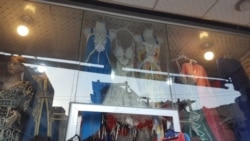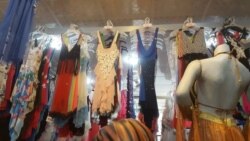Women in the Syrian city of Raqqa say their lifestyle drastically changed after U.S.-backed forces freed their city from the Islamic State terror group.
The Syrian Democratic Forces liberated the city in October 2017. Since then, Raqqa residents have been determined to bring a sense of normalcy back to their city, which was once the de facto capital of IS's self-proclaimed caliphate.
Throughout the partially restored market in downtown Raqqa, shops selling women's clothing and cosmetics now openly showcase their merchandise, something unthinkable during IS rule.
"Now, I can exhibit anything I want in front of my store," said a 37-year-old man who owns a women's boutique.
"When Daesh was here, we had to hide things like revealing clothes and lingerie in the back of the store. Men couldn't sell these things to women, so we had to hire women to sell to other women," he told VOA, using the Arabic acronym for Islamic State.
Under IS rule, strict social codes were imposed on the local population. Men and women who were not related weren't allowed to interact.
Women, in particular, were required to wear black dresses covering their entire bodies and faces. Those who disobeyed received harsh punishments, including imprisonment and flogging.
"I remember how my friend's older sister was humiliated on the street by two female IS members because they thought her face wasn't covered properly," said a 21-year-old woman who was a teenager when IS ruled Raqqa. She declined to be identified for security reasons.
The terror group had established a vice police force, locally known as al-Hisbah, whose sole mission was to implement Islamic laws and persecute those who did not adhere to them.
"There is no comparison between now and then," said Khitam al-Musa, 30, of Raqqa.
"At least now, I can walk on the street freely. I can buy what I want. In the past, I could have been arrested for the silliest reason," she told VOA. "I was taken to interrogation a few times because I painted my fingernails and wore open-toe sandals. It was unbearable to be a woman under [IS] rule."
The SDF, a Kurdish-led military alliance that has been an effective partner of the United States in the fight against IS, has established a progressive governing system in areas under its control in northeast Syria.
Women's rights and gender equality are the basis of SDF's newly formed entity, SDF officials claim.
"What the SDF has offered is a very unique alternative form of governance not only compared to IS's style, but also compared to the Syrian regime," said Sadradeen Kinno, a Syrian researcher who closely follows Islamic militancy in the war-torn country.
Kinno told VOA that while residents in Raqqa and other areas recently liberated from IS enjoy the liberty the SDF offers, it would take a long time before the group could enforce its progressive ideas among a largely conservative population.
"Individual freedoms are important for women and people in general, especially if you've just experienced life under one of the most oppressive groups in the world," he said. "But it will certainly be a major challenge for the SDF to find a receptive population for its broader gender democracy."







